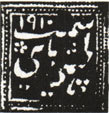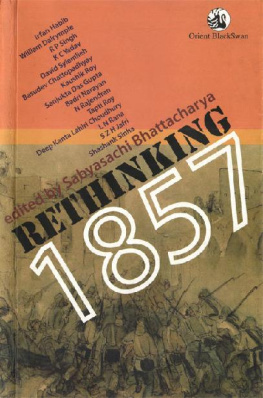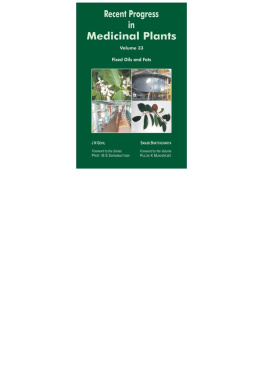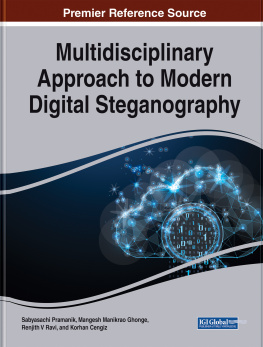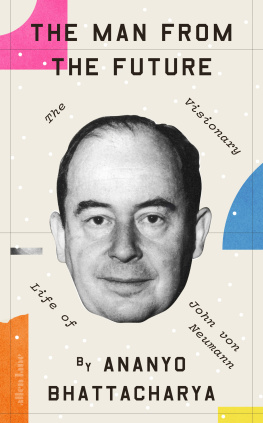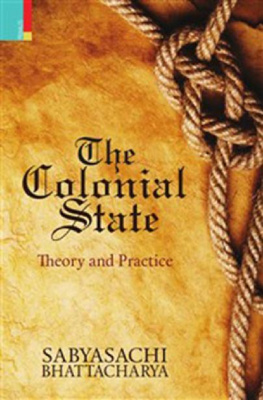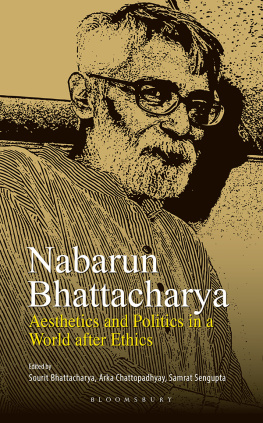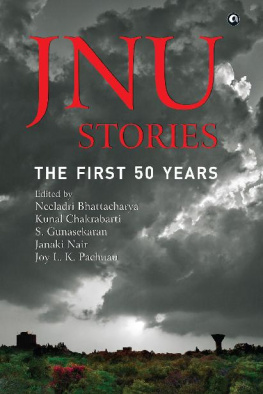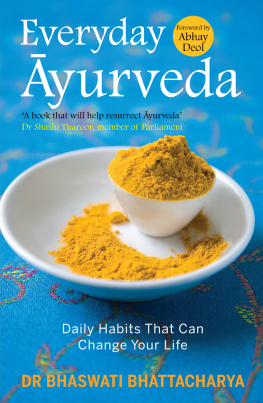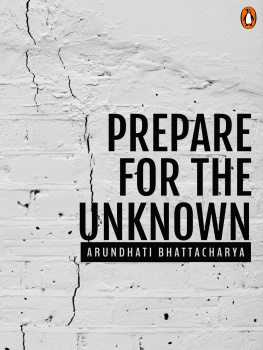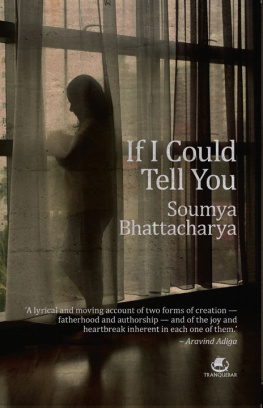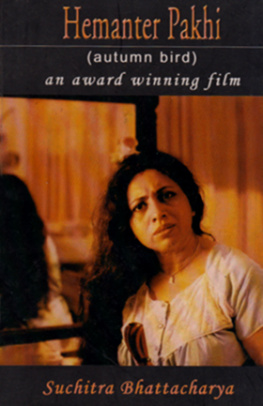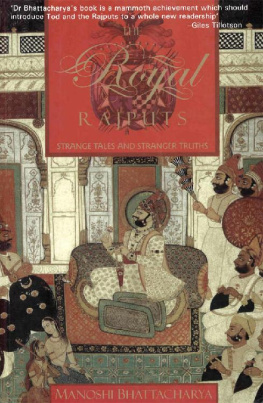R ETHINKING 1857
Sabyasachi Bhattacharya is Chairman, Indian Council for Historical Research, New Delhi. He was formerly at the Centre for Historical Studies, Jawaharlal Nehru University.
For our entire range of books please use search strings " Orient BlackSwan ", " Universities Press India " and " Permanent Black " in store.
R ETHINKING 1857
Edited by
S ABYASACHI B HATTACHARYA
cover images
Reproduction of water colour sketches by
G F Atkinson
Courtesy the Victoria Memorial Museum, Kolkata
cover design
Bindia Thapar
Orient Blackswan Private Limited
Registered Office
3-6-752 Himayatnagar, Hyderabad 500 029 (A.P.), INDIA
e-mail:
Other Offices
Bangalore, Bhopal, Bhubaneshwar, Chennai,
Ernakulam, Guwahati, Hyderabad, Jaipur, Kolkata,
Lucknow, Mumbai, New Delhi, Noida, Patna
Indian Council of Historical research, 2007
First Orient Blackswan impression 2010
Reprinted 2012
eISBN 978 81 250 5431 3
e-edition:First Published 2013
ePUB Conversion: .
All rights reserved. No part of this publication may be reproduced, distributed, or transmitted in any form or by any means, including photocopying, recording, or other electronic or mechanical methods, without the prior written permission of the publisher, except in the case of brief quotations embodied in critical reviews and certain other noncommercial uses permitted by copyright law. For permission requests write to the publisher.
C ontents
SABYASACHI BHATTACHARYA
K. C. YADAV
WILLIAM DALRYMPLE
IRFAN HABIB
L. N. RANA
SANJUKTA DAS GUPTA
SHASHANK. SINHA
BADRI NARAYAN
BASUDEB CHATTOPADHYAY
N. RAJENDRAN
TAPTI ROY
DEEP KANTA LAHIRI CHOUDHURY
KAUSHIK ROY
A cknowledgements
On behalf of the Indian Council of Historical Research I would like to thank the Chairman of the National Implementation Committee, Shri Arjun Singh of the Ministry of Human Resource Development, for a generous grant for funding the conference at which the papers in this volume were presented in December 2006 as well as for other projects to commemorate the uprising of 1857. We are particularly grateful to those who contributed to the conference, authors of the papers in this volume and in the volume that will follow; the next volume will contain the other papers presented at the conference, but not included in the present collection since the revised versions were not available to us in time. The members of the ICHR Advisory Committee on Commemoration of 1857 are to be thanked: they are Professors Irfan Habib, J. V. Naik, Arjun Dev, Iqbal Hussain, Imtiaz Ahmed, P. K. Shukla, Pramod Mehra and Amar Farooqi, with Mr. Shabi Ahmed, Deputy Director at ICHR as the secretary of the committee. Finally, I would like to thank Orient Blackswan, particularly Hemlata Shankar and Anupama Ramakrishnan, who put this volume on the fast track and provided invaluable help in preparing this volume for publication.
Sabyasachi Bhattacharya
Editor
R ETHINKING 1857
Sabyasachi Bhattacharya
I s there anything that remains to be explored in the history of 1857? Or is the uprising an exhausted subject? It is true that the literature on the subject is dauntingly large. In December 2006, a preliminary attempt by the Indian Council of Historical Research to compile a bibliography of writings and documents on 1857 reported that there are more than seven hundred items, the majority of which are contemporary accounts published in 185758 and the following decade. In 1957, on the occasion of the centenary of 1857, substantial additions were made to this literature. Some new archival sources were published, which threw new light on some hitherto ignored regions of India. A limited, but fairly lively debate on the interpretation of the events of 1857 was set off. The debate was limited because the prominent participants (including the official historian of 1857) did not go far beyond the historical sources in the English languagethe native voice in indigenous sources was scarcely heard. Nonetheless, it was a lively debate in that some ideological issues surfaced in the debate. Now, in 2007, are there new questions and new lines of investigation to be opened up, or are we now destined merely to tread on paths laid down earlier? These questions are appropriate at the beginning of a volume such as this collection of essays.
Arguably, each generation interrogates history in its own way. Today, this interrogation is moulded by concerns of the present times and such concerns may be different from those of the past. Let us consider some examples. Till recent times, few historians would have enquired into the gender aspect of the events of 1857. Today, there is a lot of interest in not only the heroines who participated in the rebellion like the Rani of Jhansi, but also in the manner in which the conflict of 1857 impacted the lives of both Indian and English women who were, more often than not, non-participant, non-combatant victims of the conflict and then of the retributions that followed. Or consider the present interest in the participation of various tribal communities in the rebelliona subject that attracted no attention earlier because of the habit of mind of academic historians to look upon these communities as marginal. Likewise, the hitherto-marginal dalits: the folk memory of Udadevi, a Pasi woman who was a close associate of Begum Hazrat Mahal in the rebellion of 1857, or the semi-mythical figure of Jhalkaribai, a dalit servant of Lakshmibai, rani of Jhansi, are now attracting scholarly attention. The current interest of historians of 1857 in aspects like gender, marginal and tribal communities, economic grievances, etc., are instances of new thinking on 1857.
A major advance likely to be made in the next few years will be the exploration of sources in vernacular or Indian languages along with greater attention being paid to the indigenous discourse on 1857 in English. That is why the Indian Council of Historical Research has invested a lot of energy and resources in this area. The sources available in government archives, as well as almost all the published, non-official contemporary accounts of 1857, are naturally from the point of view of victorious Britain. We have very few contemporary first-person narratives of Indian participants or observers. In the army, Subedar Sita Rams account seems to be unique. Occasionally, his comments take us directly into the mind of the people, e.g., when he candidly says that in annexing Oudh, the Company acted without honour. Such sources have not been used much, possibly because these have not been translated into English.
The most frequently cited works of this kind are those written by Munshi Jiwan Lal and Mainodin (or more correctly, Muinuddin) Hasan Khan. Charles Theophilus Metcalfe, son of the Resident at Delhi, Sir Thomas Metcalfe, came into the possession of these manuscripts in 1877 and the translation of and arrangement of the originals [in Urdu] were to him an endless source of interest and enjoyment, writes his wife, who published the translations after his death as Two Native Narratives of the Mutiny in Delhi . The beautiful first edition of this book in 1898 was succeeded by several poor reprints, but none of them went beyond the rough sketch about the authors presented by C. T. Metcalfe.

